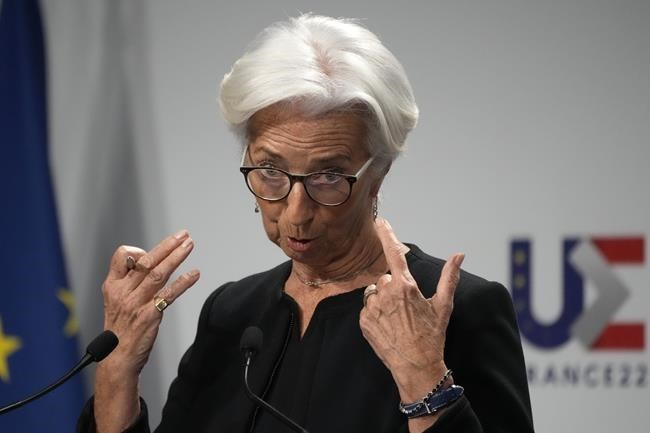The European Central Bank said Thursday that it will speed up ending its economic stimulus efforts to combat record inflation that threatens to go ever higher as energy prices soar during Russia's war in Ukraine.
The move was a tough choice because the war also has exposed Europe to a potential hit to economic growth and any moves to counter rising consumer prices could endanger that growth.
“The prospects for the economy will depend on the course of the Russia-Ukraine war and on the impact of economic and financial sanctions and other measures,” bank President Christine Lagarde said.
“At the same time, other headwinds to growth are now waning,” she said, pointing to signs that some of the supply bottlenecks that have held back business are showing “signs of easing."
Lagarde said the impact of sharply higher energy prices could be “partly cushioned” by savings that people couldn’t spend during the pandemic restrictions.
She spoke after the bank said it will end its bond purchases in the third quarter but could modify that schedule if the inflation outlook changes. Previously, it said it would taper them off to 20 billion euros per month by the last three months of the year and continue them as long as needed.
But the bank did not move up its schedule for a first interest rate increase, dropping a promise that rates would go up shortly after the end of bond purchases. It said in a statement that any rate changes will take place “some time after” the end of the bond purchases and “will be gradual.”
The purchases aim to keep borrowing costs low for companies and promote business investment and hiring.
“The ECB has signaled that it is more concerned about a further sharp rise in inflation than the negative shock to demand which will result from the war in Ukraine,” said Andrew Kenningham, chief Europe economist at Capital Economics.
Inflation in the 19 countries that use the euro currency is running at an annual 5.8%, the highest since statistics started in 1997, and is expected to keep climbing.
The European bank is still behind the U.S. Federal Reserve, which is set to raise interest rates several times this year, beginning with a modest hike next week after inflation came in at a 40-year high of 7.9%.
The recovery from the pandemic recession has lagged in Europe, which only reached pre-pandemic levels of output at the end of last year, well behind the U.S., where stimulus and support spending was higher.
The European bank is ending a 1.8 trillion euro purchase program this month and transferring some of the purchases to an existing program that will now end sooner than planned. The bank used the purchases to support the economy through the coronavirus pandemic and to keep long-term inflation on track to meet its target of 2%, assuming that high oil and gas prices and pandemic supply bottlenecks were temporary.
But that equation is changing as inflation seems to be both worse and longer lasting than originally expected. Fears of oil and gas cutoffs have sent already high energy prices even higher, leading to predictions that inflation can only go higher in the short term.
On the other hand, economic growth is at risk in the eurozone because Europe is more exposed to the war on the continent and is more dependent on Russian oil and gas than the U.S. and China.
Analysts use the term “stagflation” to describe the combination of higher inflation and weaker growth. It pulls a central bank in two directions: take steps to combat higher consumer prices could wind up hurting growth, and support for growth could worsen inflation.
The bank met before officials knew the outcome of a summit of European leaders, where a shared effort to support the economy through government spending could be discussed.
The Associated Press



